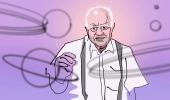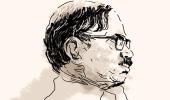He was a storyteller who made me feel the pulse of history, the stakes of human ambition, and the thrill of a well-told tale.
Prem Panicker recalls his debt to Frederick Forsyth, who passed away on Monday.

In terms of size, it was a small office situated on Greames Road, in what was then Madras.
At the time, it was the corporate office of the tyre company MRF, housing only directors and heads of departments.
And me. I was a telephone operator, manning a PABX. The work was undemanding; I had plenty of time to read.
In that office, there were a couple of fiction aficionados in high positions; once they were done with their latest finds, they would pass the books on to me.
That is how I got The Day of the Jackal, with its iconic cover of a head in profile, with a gunsight target centered on it.
The blurb promised intrigue -- an assassin, a president, a cat and mouse game for the highest of stakes -- but what I found as I raced through the book was something beyond anything I had come across thus far in my reading: A world brought to life with precision, tension, and a quiet moral weight.
Frederick Forsyth, who we mourn today, wasn't just a writer.
He was a storyteller who made me feel the pulse of history, the stakes of human ambition, and the thrill of a well-told tale.
His passing leaves a void, but his legacy, etched in his novels, their adaptations, and the minds of millions of readers like me, endures as vividly as ever.

Born on August 25, 1938, in Ashford, Kent, Forsyth lived a life that seemed ripped from the pages of one of his own thrillers.
A Royal Air Force pilot at 19, he flew Vampire jets before turning to journalism, chasing stories for Reuters and the BBC across Cold War Europe and Africa.
These experiences -- dodging danger in Paris, witnessing the Biafran War's devastation -- infused his writing with an authenticity that, to the reader, felt less like fiction and more like a peek into archives ominously marked 'Top Secret'.
He didn't just write stories -- he built worlds that were grounded in the grit and complexity of the real one.

That first novel's premise -- a lone assassin hired to kill French President Charles de Gaulle -- sounds simple, but Forsyth's execution was anything but.
Every detail, from the Jackal's forged passports to the mechanics of a custom rifle, was meticulously researched, a testament to his journalistic roots.
Much later, as a journalist trying to learn how to write (non-fiction, admittedly) and then as an editor trying to understand the mechanics of fiction so I could provide feedback to those who sought it, I deconstructed Jackal and learned much -- not least, that rules are meant to be first understood, then broken.
Think of this: The novel is a contest between a master assassin and a master detective.
When setting up such a tale, you want to bring the protagonist and antagonist onto centre-stage as early as possible, to give the audience time to get used to them, to prime the pump for the cat-and-mouse game to follow.
Forsyth trashed that dogma; his Superintendent Claude Lebel is kept off-stage for more than half the book.
That sets up a lop-sided narrative: All you see is the Jackal making his preparations, acquiring false passports by a variety of ingenious means, accumulating disguises to go with each of those fake passports, fashioning a sniper's rifle that is as deadly as it is cleverly disguised.
When Lebel finally comes on-stage, he is an underwhelming presence, confined to his cramped office, making calls, snatching sleep on a camp bed by his desk, an underwhelming cat to the Jackal's mouse.
Not to give it away to the dozen or so people who may not have yet read the book, but that is no way to set up a confrontation with such high stakes.
And yet that is the way Forsyth adopts -- and it works, brilliantly.
That book, which I read compulsively between fielding calls for MRF's movers and shakers, wasn't just a thriller: It was a masterclass in suspense, showing me how fiction could illuminate the stakes of power and survival.
Its 1973 film adaptation, with Edward Fox's chilling Jackal, brought that story to life for millions, cementing Forsyth's place in popular culture.
The Odessa File (1972) hit as hard.
Again, Forsyth didn't just tell a story; he exposed the lingering evil of the Holocaust and the complicity that let men like Eduard Roschmann slip unnoticed into the post-war world.
The novel's blend of fact and fiction, based on real SS files, made me question the narratives we accept about justice.
The 1974 film, starring Jon Voight, carried that weight to the screen, its stark visuals echoing the book's moral urgency.
The Dogs of War (1974) was where I saw Forsyth's range -- and learned another lesson in storytelling.
A tale of mercenaries plotting a coup in a fictional African nation, the story drew on Forsyth's time covering Biafra's civil war.
I was struck by how he humanised men of violence -- his protagonist Cat Shannon was neither hero nor villain but a professional navigating a morally gray world.

Which brings me to the lesson I learned -- never let your strength become your weakness.
Forsyth's stories work because he brings a journalist's curiosity, and skill at research, to his plotting.
But in Dogs, that meticulous research spilled over from the notebook to the printed page; through several initial chapters, I learned more about African politics, about plutonium, about mining, about high finance, than I ever wanted to learn. (That said, once the stakes are set and the players are given their cue, the novel swings back to the relentless pace that characterises his work).
The Devil's Alternative (1979) and The Fourth Protocol (1984) showcased Forsyth's prescience.
The former, a geopolitical chess game involving a terrorism, a hostage crisis, and a Soviet grain crisis, felt like a foreshadowing of the global fragility we see today.
The Fourth Protocol, with its plot of a rogue Soviet nuclear scheme, anticipated Cold War fears with eerie accuracy.
Its 1987 film, starring Michael Caine, brought that tension to life, proving that Forsyth's stories could resonate across decades.
These novels weren't just entertainment; they were mirrors to a world where power, betrayal, and survival collided.

Since the end of the Cold War thriller writers have been searching for a theme to replace it, and novelist Frederick Forsyth believes they may have found it in global terrorism. Photograph: R Kieran Doherty/Reuters
Forsyth's cultural impact is hard to overstate. His debut, The Day of the Jackal, redefined the thriller genre.
Before him, espionage fiction often leaned on glamour or caricature -- think James Bond's martinis shaken not stirred, or le Carré's brooding spies.
Forsyth brought a new realism, blending journalistic rigor with narrative drive.
Writers like Tom Clancy and Robert Ludlum owe him a debt, as do countless others who adopted his blueprint of research-driven suspense.
His books, translated into over 30 languages and selling tens of millions, reached readers from London to Lagos, each finding something universal in his tales of human conflict.
His influence extended to cinema, and beyond.
The adaptations of Jackal and Odessa weren't just box-office hits; they shaped how thrillers were filmed, prioritising tension and authenticity over flash and over-the-top action.
Even the 1997 remake of The Jackal, though not as taut as the first version, kept Forsyth's name alive for a new generation.

Forsyth reportedly loathed Blair. Photograph: Stephen Hird/Reuters
Epics are eminently fungible, capable of -- in fact, inviting -- multiple interpretations.
While you wouldn't class Day of the Jackal as an 'epic', it too serves as rich material for reimagination -- as in the television series that premiered last year, starring Eddie Redmayne as the Jackal.
It was written by Ronan Bennett, who gave the Jackal an origin story and a family of sorts without diluting the suspense.
Forsyth's stories resonated in unexpected ways -- The Dogs of War reportedly inspired real-world mercenaries, a testament to its unnerving plausibility, while The Fourth Protocol influenced debates on nuclear proliferation.
Forsyth didn't just entertain; he made us think about the world's fault lines.

By the time of his later novels, I had moved on in my reading tastes -- thriller fiction (call it literary pulp) no longer held the same appeal.
But each time a Forsyth novel dropped -- The Fist of God (1994) with its Gulf War intrigue, The Afghan (2006), The Cobra (2010) -- I set aside whatever literary rabbit hole I was in at the time to dip into the master's latest.
And there was his memoir -- The Outsider (2015) -- that revealed the man behind the stories -- a restless soul, humble yet fiercely curious.
Reading it felt like meeting an old friend, one who had lived a dozen lives, each of which I was weirdly familiar with through his fiction.
Through his 15 novels, he made us, his dedicated band of readers, feel the weight of choices and their consequences.
His stories demanded attention to detail, respect for complexity, and courage to face uncomfortable truths.
His work crossed borders, redefined genres and outlasted generations, speaking to anyone who has ever wondered how far we will go for power, justice, or survival.

Saying goodbye to Frederick Forsyth feels like losing a mentor I never met.
His books still sit on my shelf, their spines creased from countless reads.
And so, to the man who turned history into heartpounding fiction, I can only say: Thank you.
Photographs curated by Manisha Kotian/Rediff
Feature Presentation: Ashish Narsale/Rediff









